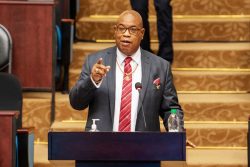Dear Editor,
Recognizing the need to clarify some misconceptions with reference to Mr. Sherwood Lowe’s letter of 9/1/2021, I have decided to respond accordingly. I will tabulate the main points.
1. A brief historical context is necessary to move this debate onwards. Reference to the constitution about fundamental individual rights has become fashionable now. It is not that this is a bad thing, but the underlying tone tends to betray this perspective. During the rule of the previous government, for example, there had been several constitutional aberrations while there was no concerted effort at securing multiple constitutional rights for the people. For any caring government it is imperative to implement certain rights once the necessary resources are available. In this context, oil-funded and other projects should have as one of their goals, the pursuit of certain fundamental rights. Just a caveat. Even in the richest country in the world, USA, the government cannot enforce all individual fundamental rights enshrined in their constitution. This also helps to explain the absence of negative sanctions in the Guyana constitution for failure to implement individual constitutional rights.
2. That Guyana oil belongs to all Guyanese and that the government should prudently utilize oil revenue to benefit all Guyanese, has never been in doubt. And so are other resources like bauxite, gold, manganese, etc. How could Guyanese benefit the most from oil revenue depends on the strategic plans being developed with inputs from civil society engagement.
3. Urgency and passion! The PPPC government needs to conceptualize, develop, and implement various oil and non-oil projects on infrastructure, education, health, housing, agriculture, etc., incorporating core elements such as equity, poverty reduction, job creation, sustainability, and regionalism. Such projects should also be informed by feasibility studies and EIS (Environmental Impact Statements). In addition, projects must be integrated into the Government’s Economic Development Strategy.
4. Furthermore, the development and implementation of these projects would likely not happen until the revised Petroleum Exploration and Production Act (1986) is finalized; the Procurement Commission is appointed; and the Natural Resource Fund Act (2019) is revised.
5. The estimate of net oil revenues amounting to less than $(US) 500 million until 2025, was based on a conservative estimate at the current level of production at 120,000 barrels per day (bpd) and at an average cost of $(US) 40 bpd for 360 days. The net revenue is calculated at $(US) 246.24 million; for a production level of 240,000 bpd the revenue is estimated at $(US) 492.48 and at 500,000 bpd the estimated revenue is $(US) 1.026 billion. The production of 500,000 bpd or 720,000 bpd is not likely to happen before 2025.
6. When an analogy was made with remittances it was merely to show that the accumulated net oil revenue for two years is not as “massive” as suggested by some people. The combined oil revenue for the first two years is less than one year of remittance. One should therefore be realistic about contributing to rising or exaggerated expectations on oil revenue.
7. Finally, reference was made to cash grants as indicators of the PPPC government’s readiness to intervene in communities throughout the country to provide relief through the adoption of appropriate policies and programs. But cash grants must be viewed as temporary relief measures and not as an enduring policy initiative. The WPA’s call for direct cash payments to each household has no support in the PPPC’s manifesto. The prospect of moving towards an entitlement society is tantalizing. Whether the PPPC government would issue conditional cash grants out of oil revenues is doubtful as these are not considered strategic instruments in national development.
Sincerely,
Dr. Tara Singh






